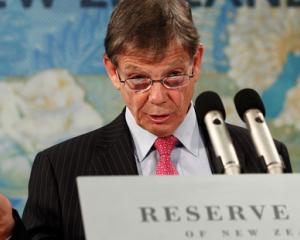New Reserve Bank governor Graeme Wheeler would face a tough call on his first outing on the official cash rate tomorrow, NZIER head of public-good research Kirdan Lees said yesterday.
The New Zealand Institute of Economic Research's "shadow board" was increasingly looking to a rate cut to boost flagging economic activity.
While participants remained "only just" comfortable with an OCR rate of 2.5% remaining as the most appropriate setting, recent economic data suggested a cut might be warranted, he said.
"Inflation is below the bottom of the band, the growth outlook for the second half of 2012 looks weak and unemployment remains stubbornly high."
Given those circumstances, the shadow board remained in favour overall of holding the OCR steady, but participants were placing a greater weight on lower rates as the recovery failed to ignite, Dr Lees said.
BNZ economist Doug Steel said the world Mr Wheeler faced remained a dour place, but no more so than it had looked in recent months.
"Importantly for markets, and helped by various policy efforts around the globe, there seems to be more belief that a very ugly downside scenario is less likely.
"There is even a hint of some improvement here and there."
Importantly, the Reserve Bank had already factored in below-consensus near-term world growth. A global backdrop of some stabilisation, and reduced tail risk, made it easier to brush off a couple of near-term weaker domestic numbers than if the world was teetering on the brink, he said.
"We think the Reserve Bank will hold the OCR at 2.5% on Thursday. After all, the domestic data surprises have been fairly marginal stuff relative to what the bank published in its September monetary policy statement," Mr Steel said.
Business and Economic Research Ltd (Berl) chief economist Ganesh Nana is calling for New Zealand to revisit its policy thinking.
Business and political leaders, officials and policymakers alike needed to approach macroeconomic policy in the new, post-2008 world with an open mind.
"If it's good enough for the International Monetary Fund to think again, it should also be good for New Zealand to at least attempt to have an informed dialogue."
Immediately labelling suggestions as "wacky" or "stunts" was not conducive to informed debate, he said. Recent international experience had seen many options once viewed as outdated and heretical now being seen again as the conventional norm.
"We need a constructive and mature debate, where minds are not closed by the relics of past dogma," Dr Nana said.
In that environment, Berl questioned the efficacy of the Government's single-minded quest for a Budget surplus in 2014-15 and the Reserve Bank's inflation control policy target.
As deleveraging was continuing across the business and household sector, and there was little relief from external demand, it might not be the appropriate time for the Government to be so focused on returning its accounts to surplus, he said.
Inflation was beneath the floor of the target band, and the exchange rate was above that consistent with a sustainable balance of payments, so an inflation target might not be the correct cornerstone of the country's macroeconomic policy framework, Dr Nana said.
At a glance
• Tough task for new Reserve Bank governor
• OCR expected to stay at 2.5%
• Growing calls for a future cut in OCR
• Berl suggests rethink of macroeconomic policy.





